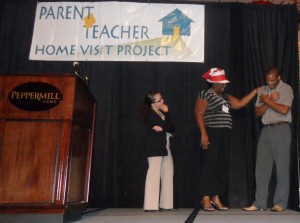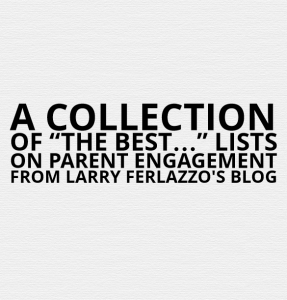Regular readers know that I’m an enthusiastic supporter of the Parent Teacher Home Visit Project. Our school has been a big supporter, I’ve written about them in my book and in other articles, I’ve helped with some of their trainings and, of course, I’ve made plenty of home visits.
I’ve also posted The Best Resources For Learning About Teacher Home Visits.
The Project recently held a national conference in Reno, Nevada, and Elaine Smith, a parent from our district — the Sacramento City Unified School District — agreed to write a guest post about it. Here is her report:
Personal stories from teachers and parents who turned their schools around deeply moved educators at a recent conference in Reno. The national gathering focused upon the Parent/Teacher Home Visit Project (PTHVP), a program that is catching on as studies show its effectiveness in creating connection between schools and their communities. Principals and school board members from eleven states shared both data and anecdotes crediting home visits with improved attendance, discipline and academic achievement, including higher test scores.
“The discoveries that parents and families make when they connect on a home visit change their lives,” says Carrie Rose, Executive Director of the non-profit sponsor of the conference, the Parent/Teacher Home Visit Project. “I know that sounds dramatic, but the research, and these stories, show how strongly it affects people.”
“My home visits did more than help me deal with behavior issues in the classroom more effectively,” says Denver special education teacher Janel Possiel, “What I was learning was the kind of growth you can’t get in a million meditation retreats. My assumptions about the parents decreased, and as they went down, my love and understanding just kept going up.”
“Home visits make me a better teacher. And because they break down barriers, make us a stronger community,” says Possiel, who was trained in the Parent/Teacher Home Visit model at a Denver workshop four years ago.
The PTHVP training helps teachers and families connect even when there may be linguistic and cultural differences. While, ultimately, academic issues are addressed, the discussion also covers the adults’ mutual hopes and dreams for the child, creating a common goal. The program emphasizes that visits are voluntary for both families and teachers, and that the school avoid stigmatizing “problem” students by visiting as many families as possible.
How-to sessions at the conference were seasoned with personal testimonies, which quickly became emotional even for classroom and administrative veterans. Tua Moua, a Principal in Roseville, CA, shed a few tears herself as she spoke of the impact of home visits on her own immigrant Hmong family.
“I was born in Ban Vinai refugee camp, in Thailand, and have 9 brothers and sisters. My father, grandfather, and uncles fought for America during the Vietnam War and were forced to flee to safety after the war. I started Kindergarten in America like so many of our children today. I’ve never sat a day in a preschool class prior to Kindergarten, nor did I speak any English.”
“But, it wasn’t until the 3rd grade that I felt a true connection with a teacher,” Ms. Moua continued. “She’d encourage me to do my best, despite the fact that I lived in Section 8 apartment housing in southeast Fresno where crime prevented my parents from ever allowing us to go outside….One special day, Mrs. Spolsdoff came inside my home. She entered and sat on our one couch, and graciously accepted the glass of water my mother gave her. She told my mother what a special daughter she had, and that it was a pleasure to have me in her class. And naturally, I translated that to my mother. In that moment, I KNEW I wanted to be a teacher.
That one home visit by Mrs. Spolsdoff changed my perception of school. After that day, she and I had a secret. She had come to my house! Mrs. Spolsdoff was in my house! You better believe I NEVER EVER wanted to disappoint her afterwards.”
Ms. Moua grew up to be a teacher and now serves as a school principal who uses home visits to connect her school with a diverse community.
“As the Principal of Earl Warren Elementary School, I encouraged my teachers to do home visits,”she said. “We built it into our pre-service days. Working in schools like Earl Warren, and like John Burroughs Elementary, the elementary school I grew up in Fresno, meant we COULD NOT GIVE UP on our kids. And not giving up starts with having a positive relationship with our children, and our families.”
Single father Paul Lumpkin, age 28, of Springfield, MA, eloquently explained the risks, and the rewards, of participating in home visits as a parent.
“My experiences with bureaucratic intuitions have not been pleasant to say the least especially with the foster care and education system,” said Mr. Lumpkin. “So when I was asked to be apart of The Parent Teacher Home Visit Project I was extremely reluctant. “
“I was thinking that something was wrong when I was picked for an actual home visit. I was nervous, thinking that these teachers are trying to get in my business because I am a single man raising a boy and a girl alone…I would soon find out I was wrong and my assumptions were creating unnecessary barriers that could potentially damage my children’s future level of sociability.”
The relationship forged with his daughter’s teacher, Marguerite Foster Franklin, has contributed to his growing role as an advocate for involved fathers, and his enrollment in college after completing his GED.
“After my visit with Mr. Lumpkin, we now have a special bond,” explained Ms. Franklin. “I continue to encourage him in all that he does for his children and his self. Parents need encouragement also, especially those who are single because there is not another adult around to discuss feelings with or support each other.”
“Participants emotional response to conference presentations makes sense,” says Ms. Rose, “because they feel the power of transformation. This isn’t just another school program. It is a fundamental change in the school’s relationship with families, and that makes fundamental progress in student and school performance.”

Mai Xi Lee, Burbank High School Assistant Principal and parents Terrence Gladney and Angel Whitfield do an exercise on stage.

